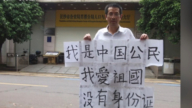【新唐人2014年02月06日訊】隨著新興社交平臺在中國大陸的普及,智慧型手機聊天軟體「微信」,與聊天網站「微博」之間的競爭,日漸激烈,兩個平臺各自擁有龐大的客戶群體。但自從去年中共當局全面箝制網絡言論,打擊和抓捕了大量「微博大V」後,「微博」使用的人數迅速減少,「微信」開始後來者居上。一場關於「微信和微博哪一個言論更自由」的討論就此展開。但有評論指出,在中共的專制體制下,無論是「微博」還是「微信」,都不會有真正意義上的「言論自由」。
英國《每日電訊報》日前公開一項調查顯示,自從中共當局對「微博」採取了實名登記制、刪貼封號、抓捕「大V」名人等一連串的打擊之後,「微博」上的帖子數量驟減70%。原本作為大陸最自由和重要新聞及輿論來源的「微博」,已經日漸蕭條,基本只剩下政府的宣傳、企業的廣告,以及名人的日常生活。
《每日電訊報》還指出,很多原本使用「微博」的人,轉而開始使用微信。
大陸財經作家蘇小和,1月30號在「微博」上發帖說:在言論自由的意義上,微博是廣場效應,微信是飯局效應。微博的式微,讓我們的廣場再一次失守,…那些在微信上罵罵咧咧的人們,膽小又憋屈,自己吞下自己的口水。那些在微博裡持續發聲的人們,才是言論自由最後的守望者。
同時,也有很多網民表示支持蘇小和的看法,認為相比「微信」,「微博」能起到更廣泛的傳播作用,但相對受到的監視和打壓也就更加嚴厲。
前《浙江青年報》記者魏楨凌:「我覺得這個說法有一定道理,因為微博的話,它的效應肯定是比較大的,所以從政府來講,中共肯定在這方面控制比微信更嚴厲。在微信這塊,因為畢竟傳播的效應沒微博那麼廣,它基本上只限於圈子,比較小的這種圈子。基本上我們都是以群為一個單位,還沒達到一種像微博涉及面那麼廣的效果。」
浙江異議作家陳樹慶:「微信的話,只是針對一群人內部相互之間溝通信息,對外的輻射影響效果有限,但群裡面相對保密,沒有絕對安全的,(安全)程度稍微高一點。」
但有些網民更加願意使用「微信」,認為「微信」的限制更小一些。
大陸社會活動家胡佳:「微信裡邊有個朋友圈功能,那個朋友圈現在已經類似於微博,而且比微博能夠展示信息量更大,可以音頻、鏈接視頻、文字、圖片,相當有份量的那些文章,被拷貝過來貼在朋友圈裡,基本朋友是個私人交際,但是有些人的朋友圈可能多達上千名微信網友。微博現在受到嚴密的打擊,刪貼、刪號,但是微信領域仍然還算是比較穩定、比較安寧的。」
不過大陸網民們不約而同的達成了一個共識,那就是,無論哪種交流平臺,在現有體制下,都不會存在真正意義上的安全和言論自由。
魏楨凌:「 沒有一個自由體制、一個制度來保障言論自由,我認為都談不上真正言論自由,就算你說有微信、微博發些牢騷是可以的,但真正要對這個社會起到一定促進作用,或者你的想法、你的觀點能夠被大家所了解,我覺得在中國根本遠遠達不到這一點的,這是顯而易見的。」
陳樹慶:「 只要共產黨它維護它的一黨專政、獨裁、特權既得利益的話,那肯定對民眾的言論自由,不管哪一種工具,它都要採取一定限制措施,它如果對民眾直接限制不行,那麼它就對網絡供應商施加壓力。」
目前使用「微信」的人數已經超過5億。而敢於在網絡發聲的人們預言,雖然「微博」日漸式微,「微信」如日中天,但隨著「微信」影響力的日益擴大,中共當局遲早會像對待「微博」一般,對「微信」採取更加嚴厲的打壓和攻擊,因為它們恐懼一切潛在的可能「 威脅」。
採訪編輯/張天宇 後製/孫寧
Weibo Posts Drop By 70%: Will Weixin Replace It?
Social media continues to become
increasingly popular in China.
A smartphone chat application called Weixin is
intensively competing with the Weibo microblog.
Both social platforms have huge users groups.
Last year, the Chinese Communist Party (CCP)
intensified censorship of online expression.
It attacked and arrested many popular Weibo bloggers.
The number of Weibo users immediately reduced,
and Weixin became the alternative platform of choice.
A debate has now started over which of the two
platforms provides more freedom of expression.
Some comment that under the CCP dictatorship system,
neither Weibo nor Weixin has real freedom of expression.
The Daily Telegraph recently published a survey.
It indicated that since the CCP launched it’s real name
registry system for Weibo users, it has deleted and closed
many user accounts, and arresting well-known bloggers.
The number of posts on Weibo has reduced by 70%.
Weibo was at one time the most important and free
resource for news and public opinion, but is now shrinking.
Only CCP propaganda, business advertisements
and news about celebrities remains on the platform.
The Daily Telegraphy reported that many
Weibo users have now moved to using Weixin.
On January 30, Su Xiaohe, a financial writer
in Mainland China, posted messages on Weibo.
“From the perspective of freedom of expression,
imagine Weibo as a public space, such as a square.
Weixin is like being at a private banquet. Weakening
Weibo has caused public expression to fall again.
People who curse on Weixin are more timid,
and only bear the suffering in their hearts.
Those who continue to speak out on Weibo are
perhaps the real watchmen of freedom of speech."
Many netizens agree with Su Xiaohe.
They believe that comparing Weixin with Weibo,
information on the latter can spread far wider.
With this, however, it also receives further
monitoring, and more severe suppression.
Wei Zhenling, former reporter, Zhejiang Youth
Daily: “I think there is logic in saying this. Weibo
has more effect, so the regime controls it tightly.
Weixin’s effect is not as good as Weibo. It only
spreads information within specific, smaller circles.
Basically Weixin uses group as units,
and it spreads far less than Weibo."
Chen Shuqing, Zhejiang activist writer:
“Weixin spreads messages inside groups.
It has limited effect to spread messages externally.
However, Weixin can keep messages relatively
confidential within groups, but not absolutely safe.
The degree of confidentiality is a little higher."
Some netizens like to use Weixin more,
and believe Weixin has less restrictions.
Hu Jia, Mainland China activist:
“Weixin has a friends of a feather circle.
This friend circle is now almost similar as Weibo,
and it can display more information than Weibo.
It can circulate audio, video, text,
pictures and relatively important articles.
These can be copied to groups of friends,
and those friends are private contacts.
Some people have over a thousand Weixin friend
contacts. Weibo is now being severely suppressed.
Posts are being deleted and users’ accounts are being
closed, while Weixin is relatively stable and peaceful."
Netizens almost all agree that no matter
which platform, under the current regime,
there isn’t real freedom of expression.
Wei Zhenling: “Without a democratic system to protect
people’s freedom of expression, it is not real freedom.
You can complain on Weixin or Weibo,
but to really push forward the society;
to have your ideas and opinions acknowledged in public
is happening far less in Communist China. It is obvious."
Chen Shuqing: “As long as the CCP maintains
a one-party dictatorship, and privilege groups with
interests, and no matter which tool the public uses.
The regime will certainly use control
measures to restrict public expression.
If the CCP cannot directly control the public,
it will put pressure on the platform providers."
Weixin user numbers have reached over 500 million.
Some online commentators predict that as Weibo
weakens, and Weixin rises to become more influential,
the CCP will soon start severely attacking Weixin.
It will experience what Weibo has done,
because the CCP fears any potential “threat".
Interview & Edit/ZhangTianyu Post-Production/SunNing





























